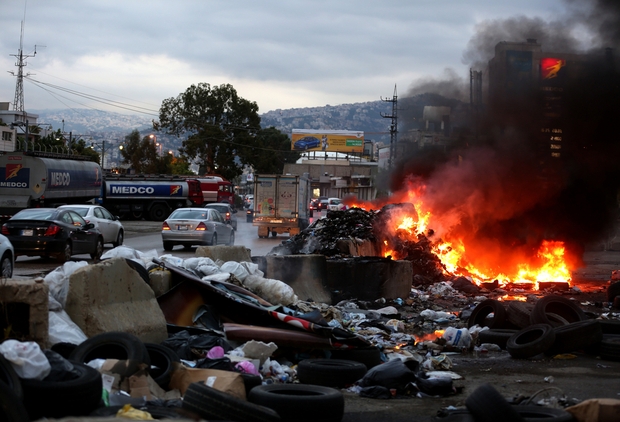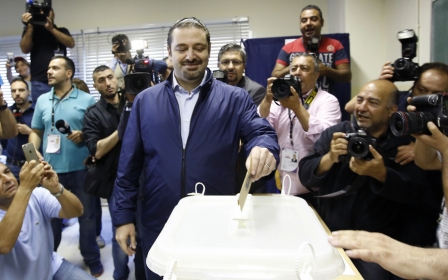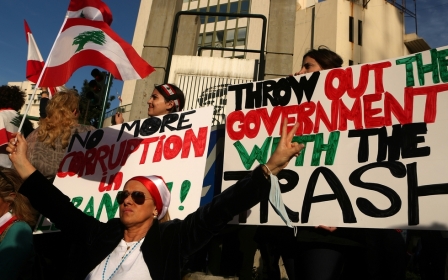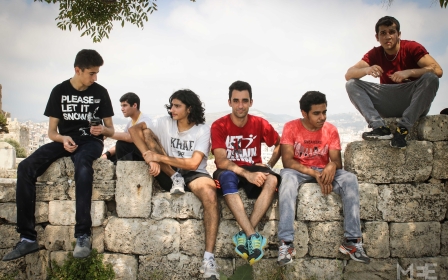Lebanon's Burj Hammoud landfill: a disaster waiting to happen

One year ago, the Lebanese state presented a solution to the garbage crisis.
Protesters, who had packed Beirut’s downtown on an almost daily basis and more adamant than ever for environmentally friendly alternatives, were shocked to hear that the government’s plan included building new landfills - and reopening an old one in Burj Hammoud, an overcrowded and impoverished neighbourhood on the outskirts of Beirut.
A handful of residents and supporters from Beirut went to the streets and protested in front of the Burj Hammoud municipality on 18 September 2015 after the plan was announced.
Today, the landfill is being prepared to open once again, despite a large pile of rubbish, known to residents as the “garbage mountain”, still standing as a bleak reminder of what the neighbourhood once endured.
Led by Minister of Environment Mohammad Machnouk and Minister of Agriculture Akram Chehayeb, the new waste management plan, including the Burj Hammoud landfill, is a recipe for disaster.
Profit over people
It was a different dump - the Naameh landfill - which first sparked the garbage protests last July. Opened in 1997, it was a purely haphazard waste mitigation scheme, which eventually started to overflow and impact on the daily lives of residents.
All signs point to a solution that puts profit over people, let alone the environment
But reopening the Burj Hammoud landfill – which was already overflowing when the rubbish crisis in Beirut made international headlines - is part of a profit-driven strategy, with severe consequences that go beyond the realms of public health and the environment.
The location of the landfill is on the coast, specifically on so-called reclaimed land that was built over water. This is not the first time that land has been reclaimed in such a way in the interest of generating revenue.
At the end of the civil war in 1990, a development project called LINOR saw beaches north of Beirut, once known as the “golden beaches” for their pristine water and lush sands, turned into landfills.
According to Chehayeb, the Burj Hammoud landfill will be open for four years, and the local municipality will receive $25m a year in development money until it closes.
Of course, the municipality can use the annual cash injection whatever way it wants to, and it can choose to sell off the land to corporations if it wants.
Yet while overcrowded Burj Hammoud, historically an Armenian neighbourhood, but now home to Syrian refugees, migrant workers from Africa and South Asia and a small Kurdish population, could use more land for affordable housing or even public spaces, the municipality has not made even the slightest effort to see what their constituency needs.
All signs point to a solution that puts profit over people, let alone the environment.
American University of Beirut Associate Professor Jad Chaaban believes that these projects are an ideal way for the establishment to make money while their resources are limited – at the expense of people and the environment, of course.
“Political parties are running out of cash, because all of the money [from foreign state donors] are going to Syria; Lebanon is insignificant,” he told me.
A struggling local movement
A small, but strong potential for a movement existed a year ago; however, Burj Hammoud residents have struggled to gain momentum to prevent the landfill from opening.
An activist, who I’ll call Carl, says that while Armenian residents support the movement and are pleased with what they are doing, they are simply too scared to go out on the streets for fear of facing problems with the Tashnag Party.
Lebanon’s largest Armenian political party, Tashnag is by far the most influential party in Burj Hammoud. Carl compares its influence and political monopoly to that of Hezbollah in Dahieh.
The party last ran for the municipality unopposed, and with Lebanon’s infamous political spying and snitching, and the feudal-like reliance on exchanging votes and support for services like healthcare, scholarships, or even jobs, residents face a massive dilemma.
Perhaps more support from people outside of Burj Hammoud will inspire people to make it to the streets; after all, snitches and spies will struggle to pick out people from a massive crowd.
Burj Hammoud’s activists have received external support, albeit it far from ideal. While You Stink has mostly resorted to social media campaigns, the Kataeb or Phalange party, a right-wing Christian party, have filled that void in Burj Hammoud.
Despite being a part of Lebanon’s establishment and having some rather frightening ultra-nationalist and sectarian politics at its core, the Kataeb also happens to have the most progressive platform for waste management, which virtually matches that of Lebanon’s protest movement.
They joined Burj Hammoud activists, even staging a sit-in in front of the entrance to the landfill, but leaving less than a month later, claiming their closeness to the dump had impacted their health.
A similar dilemma now exists among the few Burj Hammoud activists that existed during the height of Lebanon’s protest movement 365 days ago: do they opt for issue-based alliances with political parties of the establishment, or reject them all regardless?
What is to be done?
The only way that this issue will end, as well as other issues in Lebanon, is if the following idea is no longer up for debate: the domestic problems that exist in Lebanon all go back to the foundations that the country has been built on.
Will waste management be added to the long list of the most mundane public services that the so-called Paris of the Middle East cannot provide?
Sectarianism might be the icing on the cake, but what the foundation really goes back to can best be described as neo-feudalism (think of it as a combination of feudalism and neoliberalism), where dynasties trade off territory and capital, focusing purely on profit.
There is absolutely no way that Lebanon’s government, which consists of parties and many individuals that took part in a 15-year civil war, lacks a president, and is comprised of a parliament that has been illegally extending its term since 2013, is going to provide a solution that puts people over profit, or that even considers the slightest equitable form of allocating public money.
If that were the case, then buildings in Lebanon would not require external generators and water tanks for uninterrupted electricity and running water.
Burj Hammoud activist Kathy Moughalian says that many residents, including her family, have to judge the direction of the wind throughout the day to decide whether they can open their windows to avoid the stench.
Will waste management be added to the long list of the most mundane public services that the so-called Paris of the Middle East cannot provide?
At this point, it’s up to the people to decide whether they will continue to laugh off their misfortunes as they struggle to make ends meet, or whether they will organise to live a life that provides the most basic of rights.
- Kareem Chehayeb is a Lebanese writer and musician based in Beirut. He is the co-founder of Beirut Syndrome, a grassroots media platform. You can follow him on Twitter @chehayebk
The views expressed in this article belong to the author and do not necessarily reflect the editorial policy of Middle East Eye.
Photo: Smoke billows from a burning garbage dump on the northern entrance to the Lebanese capital, Beirut, on 26 October 2015 (AFP)
This article is available in French on Middle East Eye French edition.
Middle East Eye propose une couverture et une analyse indépendantes et incomparables du Moyen-Orient, de l’Afrique du Nord et d’autres régions du monde. Pour en savoir plus sur la reprise de ce contenu et les frais qui s’appliquent, veuillez remplir ce formulaire [en anglais]. Pour en savoir plus sur MEE, cliquez ici [en anglais].





